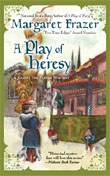CHAPTER 21
This being their first time on the pageant wagon itself, with stairs to consider and the need to pattern people’s going out of and into the stage house – the place being small enough to make such considerations very necessary – the practice went unevenly, with more thought on how and when and where to move than on what was being said…
Because with these essays I’ve reached a point in A Play of Heresy where the investigation has become everything, leaving little mention of anything else on which to comment, I’m reverting to an issue that has come up at several points during the story – the matter of Anne Deyster’s property.
Very basically, under the law – keeping in mind that what I write here is in very general terms, with allowances to be made for local variations – a woman was considered to be the responsibility of her father, then of her husband. How stringent the “I am responsible for you, daughter” was held to would depend on the individuals, however. Since we know unmarried women left home to work as servants or to go into training for trades or even to pursue their own businesses, fathers couldn’t have been in charge of all the unmarried women all the time. The same was undoubtedly true in marriages, and certainly among merchants it was possible for a woman to become legally a femme sole – a business woman for whose debts her husband could not be held responsible. Then, in the fullness of time, a widow was considered to be responsible for herself, expected to make her own decisions and run her own life. To me, this – and common sense – suggests that women were expected to be doing that to a significant degree before widowhood, rather than being powerless pawns in the male lives around them, then abruptly thrust into responsibility. Social theory is one thing; reality on the ground is usually something else.
The thing is that all but the very poorest of widows would indeed have property to make decisions about, because under the law at all levels of society a woman was held to have a right to one-third of her husband’s property at the time of his death. The idea was that a husband’s death should not automatically leave a widow impoverished. Besides this, there could/should have been agreement made at the time of the marriage regarding dowry and dower. Dowry was what the wife brought to the marriage – money or property or both. Dower was the money or property or both that the husband promised would go to his wife should she be widowed. Often the dower would include what she brought to the marriage as dowry, especially if land was involved.
Besides those provisions for her widowhood, a husband could will to his widow however much more of his property/money he wanted (supposing he was high enough in the social order that some or all of his property was not entailed to go to a specific blood-relation). To some degree how much a man could will away was limited not only by a possible entail but by the automatic legal provision that a man’s children should have one third of their father’s property at his death. Since, generally speaking, orphans were given into their widowed mother’s care until they came of age, this inheritance came under her control along with her own.
All of this could make for some very wealthy widows among merchants, gentry, and nobility, but even at the more modest level of the village, a widow could be very desirable remarriage material, and many widows did remarry. But others did not, and although the little given here barely scratches at the complexities there could be in individual situations, I trust it’s clear that Anna Deyster’s widowhood does give her economic options, with choices to consider and the freedom to make them.
For interesting reading and ample bibliographies regarding medieval wives:
Hanawalt, Barbara. The Wealth of Wives: Women, Law, and Economy in Late Medieval London. Oxford University Press, 2007
Swabey, ffiona. Medieval Gentlewoman: Life in a Widow’s Household in the Later Middle Ages. Sutton Publishing, 1999.
– Margaret
Follow the virtual bookclub for A Play of Heresy on Facebook and Twitter.
















